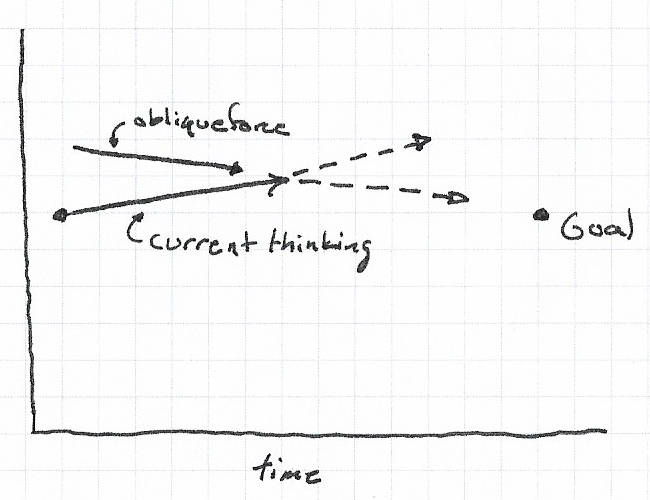What to do if you would like to join the fight for a better internet
Quit Facebook
This is the big one. Besides the post from yesterday, reading hapgood on a regular basis will help one understand why, at least on philosophical, sociological and psychological levels. The Garden and the Stream is particularly important.
Note how different this sort of meaning making is from what we generally see on today’s web. The excitement here is in building complexity, not reducing it. More importantly note how meaning changes here. We probably know what the tweet would have “meant”, and what a blog post would have “meant”, but meaning here is something different. Instead of building an argument about the issue this attempts to build a model of the issue that can generate new understandings.
This experience has radically changed me, to the point I find it hard to communicate with a lot of technologists anymore. It’s like trying to explain literature to someone who has never read a book. You’re asked “So basically a book is just words someone said written down?” And you say no, it’s more than that. But how is it more than that?
I am going to make the argument that the predominant form of the social web–that amalgam of blogging, Twitter, Facebook, forums, Reddit, Instagram–is an impoverished model for learning and research and that our survival as a species depends on us getting past the sweet, salty fat of “the web as conversation” and on to something more timeless, integrative, iterative, something less personal and less self-assertive, something more solitary yet more connected.
How Document Decomposition Helps Overcome Bias
in a world consumed with the web as an expressive engine of identity, it’s worth it to imagine a countervailing technologies that help us not only express what we know and argue with others about it but ones that actually propel us, slowly over time, to unexpected insights and deeper thoughts.
This is not meant to be a moral panic about technology, Facebook, whatever. But the tech you choose has consequences, and right now it seems to me the mix veers so far towards accretive identity-building that we are losing at least some of our capability to think about thoughts too nascent or controversial to post to our wall.
Quit all social media
The advanced course. Not for the feint of heart.
Start a blog
Not for others, but for yourself.
Creating content on the internet and actually owning all of that content and retaining complete control over that content is still one of the most culturally radical things one can do. Sure, the marketers of the world will tell you you’re wasting your time, but that is only if your horizon for meaningful impact in the world has shortened to the amount of time a news story remains in your social network feed. This is why link-rot has become an epidemic.
It used to be that the things we wrote in journals, the photographs we took, they would stack up on the shelf or accumulate in a box. House fires were the biggest threat against these artifacts of a working mind. Now the best worst-case is neglecting to pay a bill to some hosting provider. Most people are just throwing their best work to the feeds, street preachers on a corner with a million other street preachers.
Find an oblique hobby
The term oblique I am borrowing directly from Brian Eno and Peter Schmidt’s Oblique Strategies, a card set where “each card offers a challenging constraint intended to help artists break creative blocks by encouraging lateral thinking.” The same could be said for any activity that allows the brain to think about the things around it in a different way than it is normally accustomed. If you are a coder, pick up an artistic hobby. If you are an artist, start coding. Play obscure games like Dwarf Fortress or even less obscure games like Minecraft or chess. If you write non-fiction, write a role-playing game or nonlinear fiction. If you play in a punk band, score a science fiction film. If you are an entrepreneur, volunteer. If you’re an athiest, go to church. If you’re of a certain faith, read some books by athiest intellectuals.

This will also give you something to blog about.
Use the force
In order to care about your horizon for meaningful impact in the world, you need to care about meaning; in order to care about meaning you need to pause; in order to pause you need to develop some kind of contemplative practice. I am not great at this; therefore I leave my comments to those observations.